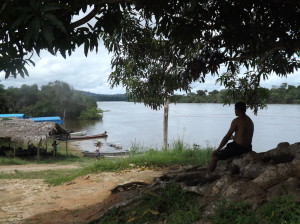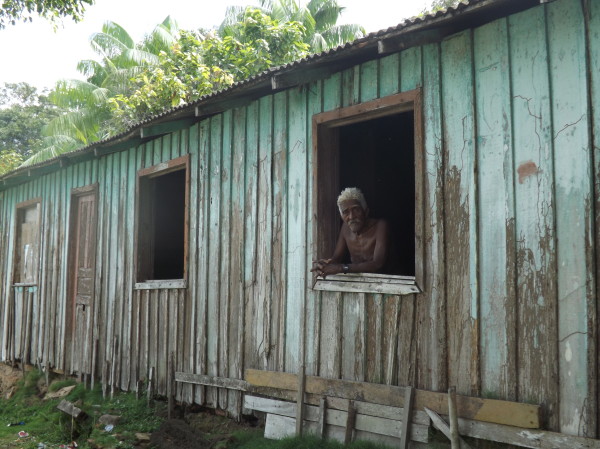The right to be heard
Pedro Martins
Article by Sheila C. da Silva Sens, student of the LLM Program on Legal Research, at Utrecht University, in the Netherlands, and student assistant of the project ‘Lands and Rights in Troubled Waters (LAR), and Pedro Martins, legal advisor of the Terra de Direitos.
Pimental is small fishing villagein the West of Pará, Brazil, with over 700 people, most of them bornand raised in the community. Several generations of families survivethere on what the Tapajós River and the Amazon Forest have to offer: water, fish, game, fruit, medicines, leisure. A short stroll in Pimental and one can notice kids swimming in the river, along with women doing laundry or cleaning fish, fishermen casting nets, some locals quietly looking out their windows, observing the water streams and passers-by.
Judging by its simple houses and tranquil atmosphere, it is easy to assume Pimental is a quiet and uneventful place, but that is not the case. The community is located in the listed area of the construction of a dam, part of the Growth Acceleration Program (PAC), an investment plan launched by the Brazilian government whose main goal is to promote large-scale infrastructure projects throughout the country for advancing economic development. Hydroelectric projects are the biggestand most symbolic of PAC, and Amazon’s river basins are their main targets.
The community fears the disastrous and irreparable harm that would be caused by the construction of a dam, drowning Pimental along with its culture andhistory. Residents will be displaced, becoming more dependent on government assistance programmes and losing the life they have known thus far. The community has been trying to be heard, but they have recievedlittle attention.
In a meeting organized by Terra de Direitos, the Movimento dos Atingidos por Barragem (MAB), the Comissão Pastoral da Terra (CPT), and the community’s association, the residents expressed their frustrationat having their existence ignored by the federal government, and their main flag of protest is their right to a consultation with the government prior the approval of the project, which has not been yet attended.The people of Pimental want to be heard, they want to express their opinion on massive dam projects in their small village and they want to question the government about alternative and more sustainable ways of managing the existent energy supply.
 Consultation and participation are the cornerstone of the Convention 169 of the International Labor Organization (ILO) on which all its provision are based. The Convention requires that indigenous and tribal peoples be consulted - through appropriate procedures, in good faith and through the representative institutions of these peoples – on issues that affect them, protecting their right to consultation and free participation in all levels in the formulation, implementation and evaluation of measures and programmes that affect them directly.[1]
Consultation and participation are the cornerstone of the Convention 169 of the International Labor Organization (ILO) on which all its provision are based. The Convention requires that indigenous and tribal peoples be consulted - through appropriate procedures, in good faith and through the representative institutions of these peoples – on issues that affect them, protecting their right to consultation and free participation in all levels in the formulation, implementation and evaluation of measures and programmes that affect them directly.[1]
Brazil has ratified Convention 169 and therefore the inhabitants of Pimental, as well as other communities affected by the dam projects, hold rightsto consultation and close participation in the development programs that affect their areas, and the people of Pimental are looking forward to standing up and telling whomever will hear them, that if they are to choose between the dam and their community, betweenbetter, if uninvited,access to energyandtheir history by the Tapajós River, they will undoubtedly choose the latter.
[1] Indigenous and Tribal Peoples Convention, 1989 – ILO Convention 169
Ações: Conflitos Fundiários,Empresas e Violações dos Direitos Humanos,Impactos de Megaprojetos,Defensores e Defensoras de Direitos Humanos
Eixos: Terra, território e justiça espacial
Tags: Growth Acceleration Program (PAC,Movimento dos Atingidos por Barragem (MAB),Pimental



